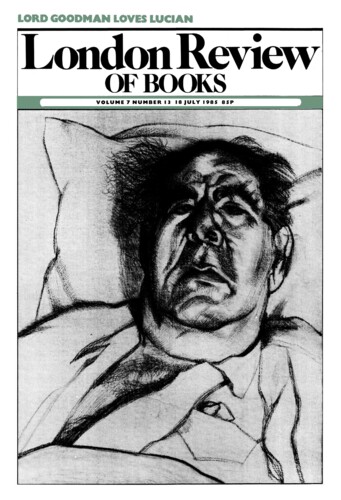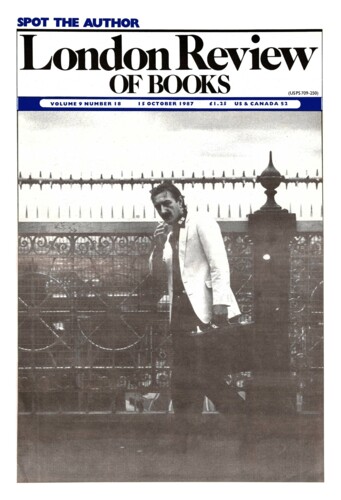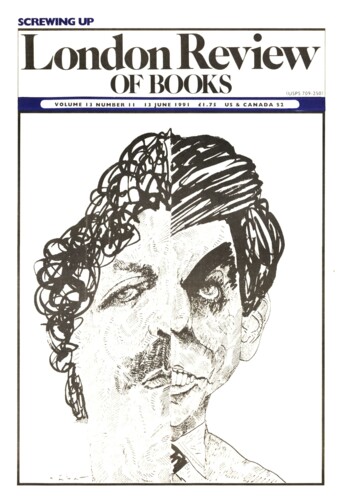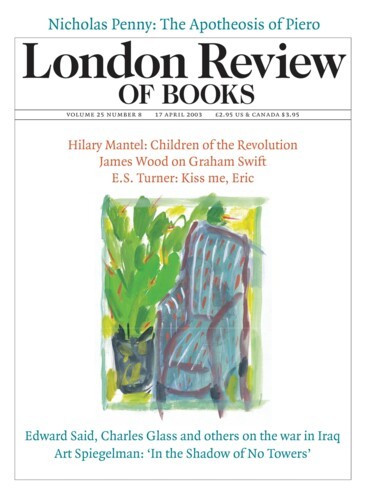Anthony Pagden
Anthony Pagden teaches at UCLA. His most recent books are La ilustración y sus enemigos and, as editor, The Idea of Europe: From Antiquity to the European Union.
Social Poetry
Anthony Pagden, 15 October 1987
Prophetically, the Island of Utopia is set in or near the Americas – More, characteristically, forgot to ask exactly where. And it was in the Americas that the most extensive, long-lived, and most fantastical, utopian experiments were conducted. The New World’s open spaces provided a constant challenge to the quirkier side of the European social and moral imagination until the end of the 19th century. Most of the early settlers came in quest of some new life. Most wished to live out some version of the privileged worlds they had been denied access to in their home countries. But there were others who came with ambitions to fabricate wholly new worlds, cities on a hill, where life could be made better, happier or morally more complete. In the Catholic South such experiments were largely confined to various attempts to reconstruct the primitive apostolic Church. One Franciscan, with an annotated copy of More’s book in his habit, went so far as to take some at least of the ‘features in the Utopian commonwealth’ and test them out on the Indians of Michoacan. The famous Jesuit ‘reductions’ in Paraguay – the subject of The Mission and now, improbably, of a Jesuit comic-book – though far from traditionally utopian, operated with the same sense that out there in the tropical rain-forests man could retrace his steps and begin again. In the North, such utopian communities were private ventures: and they proliferated – Oneida, New Harmony, Equality, True Inspiration. There was even one called Utopia. ‘We are all a little wild here,’ Emerson wrote to Carlyle in 1840, ‘with numberless projects of social reform. Not a reading man but has a draft of a new community in his waistcoat pocket.’’
Basismo
Anthony Pagden, 13 June 1991
Mexico, Mexicans sometimes say, is too far from God and too close to the United States of America. The same could be said of the whole of Latin America. Ever since the declaration of the Monroe Doctrine of 1823, a piece of political effrontery which sought to deny a role in the affairs of the hemisphere to any extra-continental power, most North American administrations have looked on the entire Southern continent as their ‘backyard’. But, as Reagan’s near maniacal obsession with El Salvador and Nicaragua makes plain, their special interest has always been reserved for Mexico, Central America and the Caribbean, the areas discussed in this, the latest stage in Leslie Bethell’s collective attempt to capture ‘Latin America’s unique historical experience’.
Oak in a Flowerpot: When Britons were slaves
Anthony Pagden, 14 November 2002
Tangier, 1684. A motley group of soldiers scrambles over the ruins of a town, burying beneath the rubble newly minted coins that bear the image of Charles II. This least remembered of the outposts of the fledgling British Empire is nearing its end. For more than a decade it had been a thriving commercial port, in which Charles, who had acquired it in 1661 when he married Catherine of...
Great Expectations of Themselves: Was there a Spanish Empire?
Anthony Pagden, 17 April 2003
At its height, roughly between 1556 and 1640, the Empire of the kings of Spain stretched from the Philippines to the shores of the North Sea. The 19th-century Russian Empire covered more territory and the British had a larger population, but no other European empire was spread so widely or embraced so many different peoples. This behemoth has conventionally been called the Spanish Empire. At...
Pieces about Anthony Pagden in the LRB
Double Doctrine: The Enlightenment
Colin Kidd, 5 December 2013
In the course of 15 years teaching history at the University of Glasgow, with between a hundred and fifty and two hundred students in my classes, I inevitably received a few complaints. Some have...
Clashes and Collaborations
Linda Colley, 18 July 1996
How should historians write about empire? Or, if you prefer, the imperial enterprise? The task is made difficult in part because many people still find it easy to confuse academic concentration...
America first
Felipe Fernández-Armesto, 7 January 1993
‘See America first’: the old tourist-office advertising slogan made it sound easy. The most famous moment in the history of exploration, however, is also one of the most baffling. In...
Criollismo
Benedict Anderson, 21 January 1988
New York, Nueva Leon, Nouvelle Orléans, Nova Lisboa and Nieuw Amsterdam – already in the 16th century, Western Europeans had begun the strange habit of naming remote places in the...
The Moral Life of Barbarians
Geoffrey Hawthorn, 18 August 1983
Spain was in doubt about its new dominion in the Antilles. In 1493, the Pope Alexander VI had granted Ferdinand and Isabel the right to conquer and also to enslave the inhabitants of the islands....
Read anywhere with the London Review of Books app, available now from the App Store for Apple devices, Google Play for Android devices and Amazon for your Kindle Fire.
Sign up to our newsletter
For highlights from the latest issue, our archive and the blog, as well as news, events and exclusive promotions.





